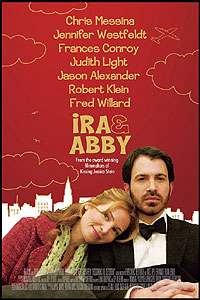Ira & Abby (R) ★★½
 If Dharma and Greg went to therapy--a lot--you might end up with something like Robert Cary's appealing but uneven romantic comedy Ira and Abby.
If Dharma and Greg went to therapy--a lot--you might end up with something like Robert Cary's appealing but uneven romantic comedy Ira and Abby.
Story
Ira Black (Chris Messina) is a prototypical movie New Yorker--he wears a lot of black, he's in therapy (well, technically analysis), and he's in the habit of over-thinking everything he does, from his Ph.D. dissertation to what to order for lunch. Then he meets free-spirited, empathetic Abby Willoughby (Jennifer Westfeldt), and everything changes. They're engaged within hours, married within a week, and in couples' therapy not long after. Meanwhile, their long-married parents--uptight, opera-going Sy (Robert Klein) and Arlene (Judith Light) Black and freewheeling, easygoing Michael (Fred Willard) and Lynne (Frances Conroy) Willoughby--have their own issues to face. And their own professionals to consult. In the end, everyone's left pondering the true meaning of love, commitment, marriage, and mental health.
Acting
When a movie's cast is as full of talented professionals as Ira and Abby's, it's hard to begrudge the fact that most of them are playing somewhat familiar characters. Messina's Ira is angsty, conflicted, and quick to question happiness--in other words, every neurotic New Yorker Woody Allen ever played. Meanwhile, Westfeldt (who also wrote the film) works the same loquacious, slightly kooky charm she perfected in Kissing Jessica Stein; you can't help liking Abby, even when you want to shake some sense into her. In the supporting cast, Klein, Light, Conroy, and Willard are all strong, rising above the ''conservative'' and ''hippie'' labels hanging over their characters' heads (it's particularly nice to see Willard in a role that's a bit toned down from his usual brand of cheerful oafishness). And familiar faces like Jason Alexander, Chris Parnell, and Darrell Hammond are a welcome, too.
Direction
Ira and Abby is only Robert Cary's second feature film credit; his first, Standard Time, was a musical, and you can see some of that genre's broad sensibility here, too. Ira's pre-Abby world is all dark colors, cool light, and sharp lines--but when he crosses into her sphere, suddenly primary hues are everywhere, rooms are suffused with warm yellow glows, and furniture is for relaxing on, not admiring. Unfortunately, too many of the same kind of obvious cues direct the story as well. Westfeldt's script is smart and often charming, but it's never very hard to guess where Ira and Abby is going: If you're looking for a ''and then they got married and lived happily ever after'' story, you won't find it here. Ira and Abby's perspective on marriage may be a bit more realistic than the Grimm brothers', but you still shouldn't recommend it to any newlyweds you know.
Bottom Line
Hollywood.com rated this film 2 1/2 stars.
To get the full Quicklook Films experience, uncheck "Enable on this Site" from Adblock Plus
box office top 10

Civil War Released: April 12, 2024 Cast: Kirsten Dunst, Wagner Moura 25.7M

Godzilla x Kong: The New Empire Released: March 29, 2024 Cast: Rebecca Hall, Brian Tyree Henry 15.5M

Ghostbusters: Frozen Empire Released: March 22, 2024 Cast: Paul Rudd, Carrie Coon 5.8M

Kung Fu Panda 4 Released: March 8, 2024 Cast: Jack Black, Viola Davis 5.5M

Dune: Part Two Released: March 1, 2024 Cast: Timothée Chalamet, Rebecca Ferguson 4.3M

Monkey Man Released: April 5, 2024 Cast: Dev Patel, Sikandar Kher 4.1M

The First Omen Released: April 5, 2024 Cast: Nell Tiger Free, Bill Nighy 3.8M

The Long Game Released: April 12, 2024 Cast: Dennis Quaid, Gillian Vigman 1.4M

Shrek 2 Released: May 19, 2004 Cast: Mike Myers, Eddie Murphy 1.4M

Sting Released: April 12, 2024 Cast: Alyla Browne, Ryan Corr 1.2M






